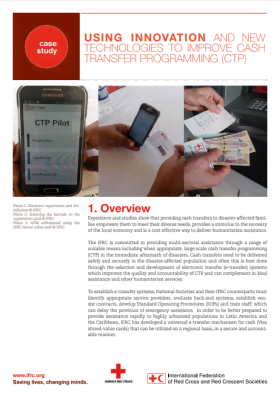Using Innovation And New Technologies to Improve Cash Transfer Programming (CTP)
Experience and studies show that providing cash transfers to disaster-affected families empowers them to meet their diverse needs, provides a stimulus to the recovery of the local economy and is a cost effective way to deliver humanitarian assistance.
The IFRC is committed to providing multi-sectoral assistance through a range of suitable means including when appropriate, large scale cash transfer programming (CTP) in the immediate aftermath of disasters. Cash transfers need to be delivered safely and securely to the disaster-affected population and often this is best done through the selection and development of electronic transfer (e-transfer) systems which improves the quality and accountability of CTP and can complement in-kind assistance and other humanitarian services.
To establish e-transfer systems, National Societies and their IFRC counterparts must identify appropriate service providers, evaluate back-end systems, establish vendor contracts, develop Standard Operating Procedures (SOPs) and train staff; which can delay the provision of emergency assistance. In order to be better prepared to provide assistance rapidly to highly urbanized populations in Latin America and the Caribbean, IFRC has developed a universal e-transfer mechanism for cash (Visa stored-value cards) that can be utilized on a regional basis, in a secure and accountable manner.
In order to test the functionality of the system and community acceptance and use of the card, a field pilot was conducted in February 2015 in Jamaica. This was the second pilot of the system, that followed an internal test that was conducted with 50 cards distributed and used by IFRC staff in Panama in December 2014.
This field pilot included vulnerable households similar to those likely to receive assistance following a disaster and included Red Cross staff and volunteers who would manage such programmes. The purpose was to see if this e-transfer system for unconditional case based assistance was appropriate, easy to use and provided a way for households to meet their immediate needs. At the same time the pilot allowed IFRC to test the pairing of the regional stored-value card system with an electronic household registration and distribution tool and identified ways to refine and improve this system for use in future disaster responses.



